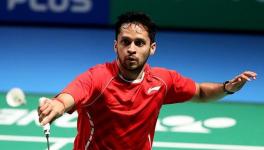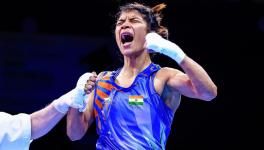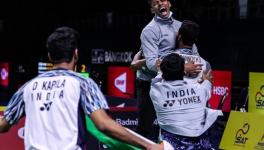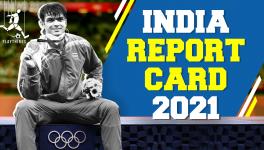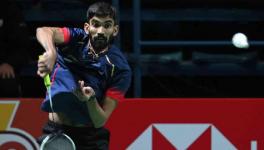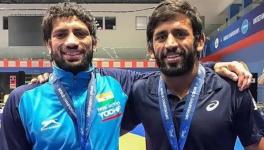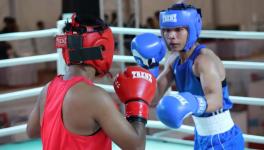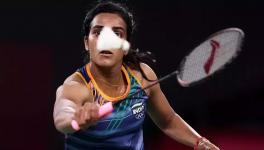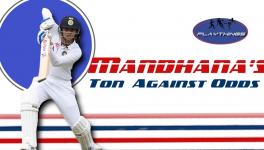London Eye: India’s Greatest Olympic Fortnight
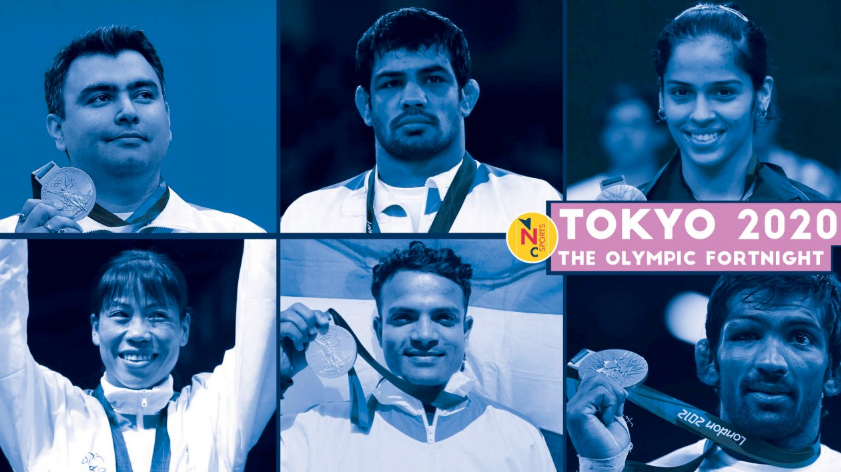
(Clockwise from top left) The Indian medalists from London 2012 -- Gagan Narang, Sushil Kumar, Saina Nehwal, Yogeshwar Dutt, Vijay Kumar, MC Mary Kom.
Sushil Kumar made a brief appearance in London when Queen Elizabeth II, accompanied by Prince Phillip, Duke of Edinburgh, officially declared the 30th Olympiad open on July 27, 2012. He was in the march past as India’s flag bearer as the world watched the impressive opening ceremony designed by Oscar-winning director Danny Boyle.
Sushil and his coach, late Yashvir Singh, left for Heathrow even before the musical show “Hey Jude” could be finished. Speaking from the airport, he told this correspondent, “We are leaving for Belarus for training. I will return only for the last few days since my event is on the last day of the Olympics. I am looking for the gold.”
Sushil couldn’t keep his promise, though he came very near. By winning silver, he became the first Indian to win an individual medal in back to back Olympics. It also capped off India’s finest fortnight in its sporting history.
Click | For more stories/videos from ‘Tokyo 2020, The Olympic Fortnight’ series by Newsclick
Between July 30 and August 12, India bagged six medals -- two silvers and four bronze, their best ever show. Unlike Beijing, a yellow metal did elude India, but it couldn’t take the shine off the celebrations.
When Gagan Narang opened India’s medals tally on July 30 in the 10m air rifle event, the Royal Artillery Barracks was packed with Indians. But few were looking at Narang then. Can the defending champion, Abhinav Bindra do an encore, was the point of discussion among the fans.
Bindra did a splendid job by reaching the final, but was overshadowed by Narang. He was an epitome of concentration from the start. When the names of the participants were announced, he didn’t even raise his hand to acknowledge the strong Indian presence.
“I was concentrating, so I kept quiet. Did you notice how (Alin George) Moldoveanu (of Romania) reacted when his name was called? He also kept mum and did not look up,” said Narang later. Moldoveanu went on to win the gold.
All said and done, Narang was expected to do well. His four-gold haul in the 2010 Commonwealth Games in New Delhi was still fresh in memory. But few could imagine 25m rapid fire pistol shooter Vijay Kumar would come up with such a stunning strike that fetched him the silver medal, India’s fourth and till date the last shooting medal at the Games.
Earlier that day, the Indians suffered a disappointment. In the 50m rifle prone, Joydeep Karmakar came close to winning a medal, but finished fourth behind Slovenia’s Rajmond Debevec. Some Indian journalists were still busy talking to Joydeep when news came that Vijay was making things utterly difficult for his rivals.
Also Read | Tokyo 2020: The Games That Begin Today, Next Year
The 26-year-old Indian Army pistolman from Himachal beat back the challenge of the then world champion Alexei Klimov of Russia, China’s Ding Feng and Zhang Jian and German Christian Reitz in the 40-shot final to finish runner-up behind Cuba’s Leuris Pupo, who shot his way to the gold with a world record equaling score of 34.
Indian fans were absolutely ecstatic. So was the Indian media. By the time Vijay finished giving his “reactions” and “bites”, the last bus for the Games Village had already left. He was forced to board the bus for the media. When the volunteer in the media bus demanded his media accreditation card, he showed her the silver medal. The soft spoken lady raised her eyebrows and then allowed him with a laugh.
Joydeep, too, boarded the bus with Vijay. As Vijay, naturally, hogged the limelight, Joydeep could be seen sitting beside the window with a vacant look in his eyes. He was pitted in a strong field, did exceptionally well, yet missed the opportunity to return home with an Olympic medal.
There are times when one does everything right, but still miss the opportunity to stand on the podium. Maybe it is the other way round at times. Such things are part and parcel of sporting life. A couple of days after Vijay struck silver and Joydeep bit the dust, Saina Nehwal fetched a bronze, courtesy the withdrawal by her opponent.
Well, faces don’t lie, and Nehwal’s didn’t either.
Her place in Indian badminton folklore was confirmed when she was declared the winner of women’s singles bronze medal, but her face gave away the true story.
On that Saturday afternoon, Saina did not have the most auspicious of starts against her Chinese rival, Xin Wang, the world No. 2. She lost the first game 18-21 and was trailing 0-1 in the second when Wang conceded the tie because of a left knee injury.
Her rival’s decision to concede the game meant Nehwal scripted her name in the history books, but not in the bold letters she probably had hoped for. “After my defeat in the semifinals, I was confident of winning the bronze medal,” she said later. It didn’t sound too convincing.
Also Read | Marcelo Bielsa: Genius That’s Hard to Miss, Harder to Notice, Impossible to Fathom
Nehwal showed little emotion after it was confirmed that she was India’s third medallist at London. She shook hands with chair umpire Mark Speight, embraced her injured rival and waved at the cheering crowd. All through, her expression remained guarded. She clearly looked conscious of the fact that the victory had come by default.
But again, she couldn’t be blamed for what happened to her rival. On the contrary, she opened a new chapter in Indian badminton history. England won their only World Cup at Wembley. The seed of India’s current badminton success was sown at the same arena by Nehwal on August 3.
After Nehwal’s success, India’s focus shifted to Excel Centre, which hosted six disciplines, including boxing and wrestling. Five-time World champion MC Mary Kom did well to storm into the semifinals in the 51kg flyweight category only to bump into the “wrong” opponent.
Highly skillful Nicola Adams carried British hopes on her shoulder. In the sea of Union Jack, led by Prime Minister David Cameroon, Indian fans were completely outnumbered. Even film star Abhishek Bachchan found it difficult to get a ticket for the bout.
Inside the ring, Mary was totally outclassed. In the end, the 11-6 verdict looked somewhat respectable. The occasional shouts of “India, India” could do little to lift Mary’s spirit. Nevertheless, it was a historic occasion for India. Mary became the first Indian woman boxer to win a bronze.
Like in shooting, one more surprise awaited India in the wrestling arena. Focus always was on Sushil, but Yogeshwar Dutt stole the limelight in the 60 kg freestyle a day before Sushil hit the mat. His pre-quarterfinal conqueror Besik Kudukhov of Russia did Dutt a good turn by reaching the final. That allowed the Haryana youth a shot at the bronze through a “repechage” round.
Yogeshwar grabbed his chance by the neck, notching three straight wins in less than an hour, including the now famous phittle roll on North Korea’s Jong Myong Ri to outclass him in the bronze play-off.
“Jo jita wohi Sikandar,” Yogeshwar said. “Today I am a hero, but a defeat would have reduced me to a zero. Four years ago, I finished fourth at Beijing after losing in the last four seconds. No one remembered me at that time.”
Also Read | The Selling of a Car and the Irrationality of Those Who Criticise It
Indian wrestling’s finest moment, however, came on the last day of the Games. In the 66kg freestyle, Sushil settled for a silver, losing to Japan’s Tatsuhiro Yonemitsu.
Before this, Sushil Kumar was simply unstoppable. The previous day he was found slightly overweight and coaches made him work hard to make it during weigh-in. He was not feeling too well in the morning of the bouts.
In the semifinal against Kazakhstan’s Akzhurek Tanatarov, Sushil won a hard fought battle. Tanatarov was not found to be a graceful loser. His coach alleged the Indian wrestler bit the ear of his ward during the bout. The video, however, didn’t prove the charge.
An hour after the medal ceremony, Sushil looked relaxed. When a couple of mediapersons, including this correspondent, approached him for his side of the story, Sushil laughed and said: “Well, you should know I am a strict vegetarian. I wouldn't change that just for a medal!”
Sushil’s jovial mood summed what every Indian was feeling at that point, the last day of the London Games and the end of the country’s most successful campaign at the quadrennial celebration of sporting excellence.
Get the latest reports & analysis with people's perspective on Protests, movements & deep analytical videos, discussions of the current affairs in your Telegram app. Subscribe to NewsClick's Telegram channel & get Real-Time updates on stories, as they get published on our website.









